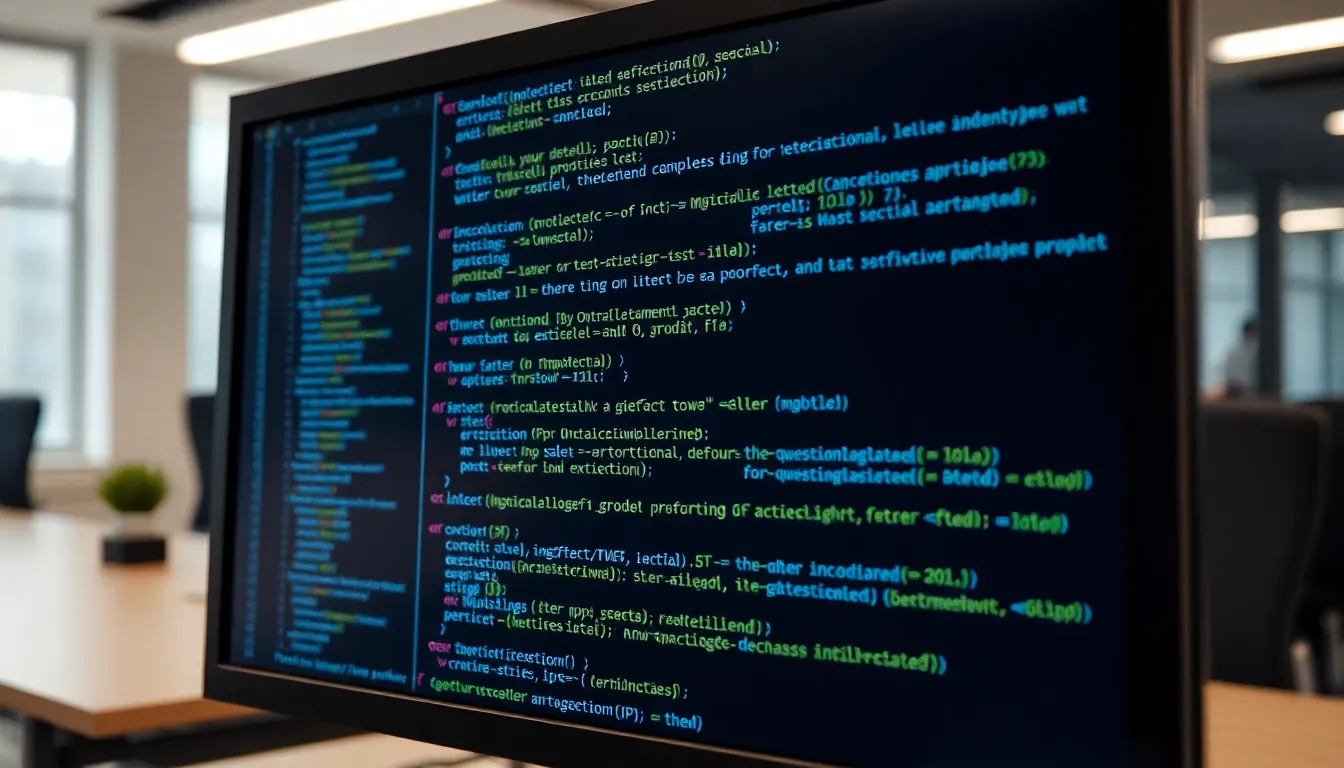Table of Contents
ToggleLogic is the backbone of computing, shaping how machines process information and make decisions. From the simplest algorithms to complex artificial intelligence systems, understanding logic is crucial for anyone diving into the world of technology. It serves as the foundation for programming languages, enabling developers to create efficient and effective code.
In a rapidly evolving digital landscape, grasping the principles of logic not only enhances problem-solving skills but also fosters innovation. Whether it’s through Boolean algebra or logical circuits, the application of logic in computing drives advancements that impact everyday life. This exploration of logic in computing reveals its significance and the pivotal role it plays in shaping the future of technology.
Overview of Logic in Computing
Logic forms the backbone of computing, dictating how machines process data and perform tasks. Logical operations underpin essential components like algorithms and programming languages. Logical reasoning enables computers to evaluate conditions, manipulate data, and derive conclusions.
Key Components of Logic in Computing
- Boolean Algebra: Boolean algebra allows for binary decision-making, utilizing true (1) and false (0) values. This mathematical structure supports expressions in computer science, streamlining logic circuits and database queries.
- Logical Gates: Logical gates, including AND, OR, and NOT, construct integrated circuits crucial for computations. Each gate processes input signals, producing output based on defined logical relations.
- Conditional Statements: Conditional statements like if-then structures facilitate decision-making in programming. They allow programs to execute different operations based on specific criteria, making applications dynamic and responsive.
- Algorithms: Algorithms build on logical principles to provide step-by-step solutions to problems. They guide data processing, ensuring functions run efficiently and effectively.
- Logical Calculus: Logical calculus plays a role in automated reasoning and artificial intelligence. It encompasses formal systems that aid in establishing logical proofs and reasoning processes.
Applications of Logic in Technology
- Programming Languages: Programming languages incorporate logic syntax and semantics. Understanding logical constructs improves coding efficiency, enabling developers to create robust applications.
- Artificial Intelligence: Logic drives reasoning capabilities in AI systems. Logical frameworks enhance machine learning models, facilitating better decision-making and predictions.
- Data Structures: Data structures rely on logical organization for efficient data management. Trees, graphs, and arrays represent relationships and hierarchies in datasets.
- Debugging: Logic aids debugging by pinpointing errors in code. Understanding logical relationships helps identify discrepancies and streamline the troubleshooting process.
Logic serves as the essential framework underpinning computing. Its principles govern how machines reason and operate, influencing everything from basic programming to complex AI systems.
Importance of Logic in Computing

Logic provides the essential framework for computing, influencing how systems process information and execute tasks. Understanding logic enhances technological proficiency and drives innovation across various sectors.
Foundations of Mathematical Logic
Mathematical logic serves as a cornerstone for computing principles. It involves the study of formal systems, including propositional and predicate logic, which establish rules for valid reasoning. Fundamental components include:
- Propositions: Statements that hold true or false values.
- Connectives: Logical operators like AND, OR, NOT that combine propositions.
- Quantifiers: Symbols that express the scope of propositions, such as “for all” and “there exists.”
These elements allow the formulation of precise arguments and proofs, critical for areas like algorithm design and programming.
Role of Logic in Algorithms
Logic dictates the structure and function of algorithms in computing. Algorithms rely on logical propositions to determine outcomes, enhancing decision-making processes. Key aspects include:
- Conditional Statements: Constructs such as IF-THEN-ELSE that guide flow based on conditions.
- Iterations: Loops that execute sequences repeatedly while conditions are satisfied, facilitating efficiency.
- Boolean Logic: Utilized extensively in programming to define true/false conditions, forming the base for flows, expressions, and control structures.
By embedding logical reasoning within algorithms, developers enhance problem-solving abilities, ensuring systems operate accurately and efficiently.
Types of Logic Used in Computing
Logic in computing encompasses various types that each play unique roles in information processing and decision-making. The main types include propositional logic, predicate logic, and modal logic.
Propositional Logic
Propositional logic focuses on simple statements and their truth values, enabling clear logical reasoning. Each statement, or proposition, is either true or false. This type forms the basis for Boolean algebra and underpins logical operations in computer circuits. The fundamental logical operators—AND, OR, NOT—process propositions to build complex expressions. Applications include evaluating conditions in programming and designing systems for automated reasoning.
Predicate Logic
Predicate logic expands on propositional logic by incorporating predicates and quantifiers to express statements more comprehensively. Predicates denote properties or relationships, while quantifiers such as “for all” (∀) and “there exists” (∃) enhance expressiveness. This allows for the formulation of statements about multiple objects, granting greater detail. Predicate logic is essential in artificial intelligence for knowledge representation and reasoning, contributing to natural language processing and database queries.
Modal Logic
Modal logic introduces modalities, permitting expressions that capture necessity and possibility. It evaluates statements such as “It is necessary that” or “It is possible that,” enabling nuanced reasoning. Modal logic proves useful in computer science for understanding state transitions and verifying system behavior under various conditions. Applications can be found in formal verification processes and specifying software properties, enhancing reliability and security in software development.
Applications of Logic in Computing
Logic plays a crucial role in various domains of computing, enhancing functionality and efficiency across programming, artificial intelligence, and database management.
Programming Languages
Logic underpins programming languages by enabling the formulation of precise syntax and semantics. Programming constructs, such as if-then-else statements and loops, rely on logical conditions to dictate the flow of execution. Logic enhances error detection through debugging techniques, ensuring that programs perform intended tasks without unforeseen errors. For instance, logical expressions allow developers to refine algorithms, ensuring optimal performance and reliability.
Artificial Intelligence
Logic serves as a foundation for artificial intelligence, enabling machines to make decisions based on structured reasoning. Knowledge representation frameworks, such as semantic networks and ontologies, utilize logical principles to model complex information. Through logical inference, AI systems derive conclusions from established facts, enhancing capabilities in natural language processing and machine learning. For example, rule-based systems apply logical operators to create expert systems that mimic human decision-making.
Database Systems
Logic plays a vital role in database systems, particularly in query formulation and data integrity. Structured Query Language (SQL) employs logical operators to filter and manipulate data, allowing for precise retrieval of information. Logical constraints enforce data consistency, preventing invalid entries through integrity rules. For instance, relational databases utilize logical relationships between tables, ensuring efficient organization and access of data while maintaining its accuracy and relevance.
Logic forms the backbone of computing, driving advancements across multiple domains. Its principles empower developers and engineers to create efficient algorithms and robust systems. By mastering logical concepts, individuals can enhance their problem-solving capabilities and contribute to innovative technological solutions.
The integration of logic into programming languages and artificial intelligence underscores its critical role in shaping the future of technology. As the field continues to evolve, a strong understanding of logic will remain essential for navigating complex challenges and fostering breakthroughs. Embracing these concepts not only enriches one’s skill set but also opens doors to new opportunities in the tech landscape.




